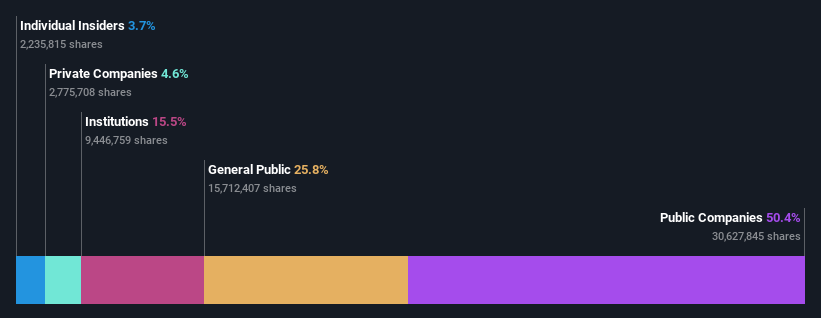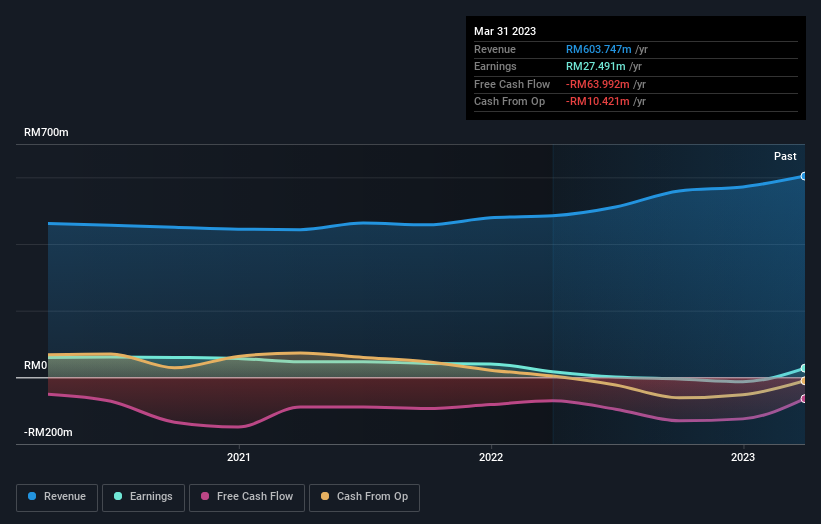While individual investors own 26% of Ajinomoto (Malaysia) Berhad (KLSE:AJI), public companies are its largest shareholders with 50% ownership
Key Insights
Ajinomoto (Malaysia) Berhad's significant public companies ownership suggests that the key decisions are influenced by shareholders from the larger public
Ajinomoto Co., Inc. owns 50% of the company
Institutional ownership in Ajinomoto (Malaysia) Berhad is 16%
A look at the shareholders of Ajinomoto (Malaysia) Berhad (KLSE:AJI) can tell us which group is most powerful. We can see that public companies own the lion's share in the company with 50% ownership. Put another way, the group faces the maximum upside potential (or downside risk).
Individual investors, on the other hand, account for 26% of the company's stockholders.
In the chart below, we zoom in on the different ownership groups of Ajinomoto (Malaysia) Berhad.
See our latest analysis for Ajinomoto (Malaysia) Berhad
What Does The Institutional Ownership Tell Us About Ajinomoto (Malaysia) Berhad?
Institutional investors commonly compare their own returns to the returns of a commonly followed index. So they generally do consider buying larger companies that are included in the relevant benchmark index.
Ajinomoto (Malaysia) Berhad already has institutions on the share registry. Indeed, they own a respectable stake in the company. This suggests some credibility amongst professional investors. But we can't rely on that fact alone since institutions make bad investments sometimes, just like everyone does. If multiple institutions change their view on a stock at the same time, you could see the share price drop fast. It's therefore worth looking at Ajinomoto (Malaysia) Berhad's earnings history below. Of course, the future is what really matters.
Hedge funds don't have many shares in Ajinomoto (Malaysia) Berhad. Our data shows that Ajinomoto Co., Inc. is the largest shareholder with 50% of shares outstanding. This essentially means that they have extensive influence, if not outright control, over the future of the corporation. Meanwhile, the second and third largest shareholders, hold 3.8% and 3.0%, of the shares outstanding, respectively.
While studying institutional ownership for a company can add value to your research, it is also a good practice to research analyst recommendations to get a deeper understand of a stock's expected performance. Our information suggests that there isn't any analyst coverage of the stock, so it is probably little known.
Insider Ownership Of Ajinomoto (Malaysia) Berhad
The definition of company insiders can be subjective and does vary between jurisdictions. Our data reflects individual insiders, capturing board members at the very least. Company management run the business, but the CEO will answer to the board, even if he or she is a member of it.
I generally consider insider ownership to be a good thing. However, on some occasions it makes it more difficult for other shareholders to hold the board accountable for decisions.
We can report that insiders do own shares in Ajinomoto (Malaysia) Berhad. In their own names, insiders own RM37m worth of stock in the RM1.0b company. This shows at least some alignment. You can click here to see if those insiders have been buying or selling.
General Public Ownership
The general public-- including retail investors -- own 26% stake in the company, and hence can't easily be ignored. This size of ownership, while considerable, may not be enough to change company policy if the decision is not in sync with other large shareholders.
Private Company Ownership
It seems that Private Companies own 4.6%, of the Ajinomoto (Malaysia) Berhad stock. Private companies may be related parties. Sometimes insiders have an interest in a public company through a holding in a private company, rather than in their own capacity as an individual. While it's hard to draw any broad stroke conclusions, it is worth noting as an area for further research.
Public Company Ownership
It appears to us that public companies own 50% of Ajinomoto (Malaysia) Berhad. It's hard to say for sure but this suggests they have entwined business interests. This might be a strategic stake, so it's worth watching this space for changes in ownership.
Next Steps:
While it is well worth considering the different groups that own a company, there are other factors that are even more important. Consider for instance, the ever-present spectre of investment risk. We've identified 1 warning sign with Ajinomoto (Malaysia) Berhad , and understanding them should be part of your investment process.
Of course this may not be the best stock to buy. So take a peek at this free free list of interesting companies.
NB: Figures in this article are calculated using data from the last twelve months, which refer to the 12-month period ending on the last date of the month the financial statement is dated. This may not be consistent with full year annual report figures.
Have feedback on this article? Concerned about the content? Get in touch with us directly. Alternatively, email editorial-team (at) simplywallst.com.
This article by Simply Wall St is general in nature. We provide commentary based on historical data and analyst forecasts only using an unbiased methodology and our articles are not intended to be financial advice. It does not constitute a recommendation to buy or sell any stock, and does not take account of your objectives, or your financial situation. We aim to bring you long-term focused analysis driven by fundamental data. Note that our analysis may not factor in the latest price-sensitive company announcements or qualitative material. Simply Wall St has no position in any stocks mentioned.


